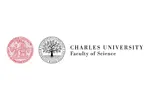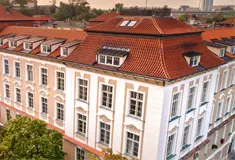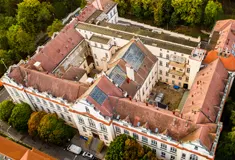The Faculty of Science is part of Charles University in Prague, the oldest university in Central Europe. Charles University was founded by Charles IV in 1348 and initially consisted of four faculties – the Faculty of Liberal Arts, Faculty of Theology, Faculty of Medicine and Faculty of Arts. The Faculty of Science, one of the largest, was established as the fifth faculty of the University on 24 June 1920. The Faculty of Science of Charles University consists of four specialised sections – Biology, Chemistry, Geography and Geology – and one interdisciplinary institution – the Institute for Environmental Studies.
The individual sections incorporate departments and research centres committed to research and education in their respective scientific fields. The Faculty also has three museums – the palaeontological Chlupáč Museum of Earth History, the Mineralogical Museum and the Hrdlička Museum of Anthropology. The Faculty also has a unique collection of historical maps and a renowned botanical garden with a geological park. All these facilities are open to both experts and the general public.
Graduates of the Faculty of Science are well prepared to conduct independent scientific work and receive a superb background for a successful international career. Thus, graduates from the Faculty make up a large part of the personnel at a number of research institutes of the Academy of Sciences, have become top ranking scientists at Czech regional universities and many of them pursue successful careers in companies and foreign organisations.
Become a STAR at science in Prague!
Are you a talented, aspiring researcher with a passion for natural sciences? Look no further than the STARS programme at the Faculty of Science at Charles University! Each year, we release multiple project calls (ranging from 30 to 50), bolstering our scholars' research endeavors throughout their doctoral studies. From day one, students become integral members of research teams, enabling them to fully immerse themselves in their projects. Thanks to this support, our students consistently graduate within the standard timeframe.
Financial stability is a core element of the STARS promise. Students can rely on a guaranteed monthly stipend of at least 20,500 CZK (equivalent to approximately 800 EUR). The actual amount may surpass this base level, depending on the specific funding available for individual projects.
The STARS program is open to master's degree holders in sciences, medicine, pharmacology, and related fields of study. Even those in their final year of studies, who anticipate receiving their degree diploma at the start of their PhD journey, are welcome to apply. While proficiency in English is important, there's no need for formal English exams.
Our vision is global, and we aim to attract the brightest minds from across the world. During the upcoming STARS 2024 call, prospective students can submit their applications for PhD research topics, which will be revealed on our website on January 8th, 2024. The application deadline is set for March 13, 2024.
Join the STARS program at Charles University's Faculty of Science and embark on an academic journey that nurtures your potential and ensures a solid foundation for your research aspirations.










